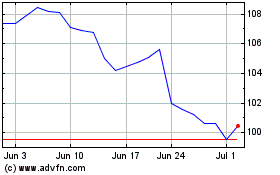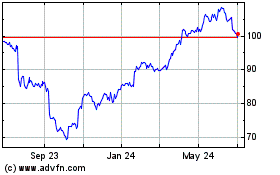Raytheon Shrinks to Fit Jet Downturn
October 27 2020 - 1:32PM
Dow Jones News
By Doug Cameron
Raytheon Technologies Corp., the biggest aerospace supplier by
sales, said it is cutting 20,000 jobs this year as it adjusts to
the shrinking airline industry and the sharp drop in jetliner
orders and deliveries.
The company, which supplies engines, aircraft seats and other
parts to airlines and plane makers, said the cuts include a 20%
reduction in its commercial arm. It is also reducing its office and
factory space by as much as a quarter in response to
pandemic-driven changes in demand and working conditions.
Raytheon had previously disclosed around 15,000 job cuts at its
Collins Aerospace and Pratt & Whitney engine arms. It said
Tuesday that contractor hiring had been halved to 4,000, while
corporate staff was reduced by 1,000.
Aerospace suppliers are shedding thousands of jobs in response
to the collapse of airline traffic, though Raytheon has been able
to fall back on military sales such as engines for the F-35 combat
jet and Patriot missiles.
Defense rivals in recent days have flagged slowing growth in
Pentagon spending because of the soaring federal budget
deficit.
"Defense business also gives us the ability to continue to
invest through this cycle and to make sure that we have the right
technologies for the future," Chief Executive Greg Hayes said on an
investor call as Raytheon reported a 77% drop in quarterly
profit.
Its shares were recently down more than 4.5%.
Raytheon didn't provide financial guidance for 2020, but
analysts forecast sales of around $64 billion that would surpass
those of Airbus SE and Boeing Co. for the second year in a row.
Sales at Raytheon's Pratt & Whitney jet engine unit fell by
a third in the quarter, while revenue from aircraft parts halved as
manufacturers reduced production and airline flying remained
subdued.
Raytheon expects its sales of parts and engines to Airbus and
Boeing to be down about 40% this year and in 2021 compared with
last year, with minimal shipments of parts for the Boeing 737
MAX.
Mr. Hayes said he didn't expect 2019 levels of flying to return
before 2023 at the earliest, and the main airline trade group on
Tuesday also tempered expectations for an industry recovery.
The International Air Transport Association forecast global
airline revenues would be about $400 billion next year compared
with an estimated $350 billion in 2019. It pared previous estimates
from August because of rising coronavirus cases and pushed back
when it expects a vaccine to be widely available.
Airlines have cut back sharply on maintenance spending as they
have cut flying, hitting large and small suppliers. Raytheon Chief
Financial Officer Toby O'Brien said the health of its own supply
chain had improved over the quarter. He said the company had
concerns about only some 50 of its 13,000 suppliers.
Write to Doug Cameron at doug.cameron@wsj.com
(END) Dow Jones Newswires
October 27, 2020 13:17 ET (17:17 GMT)
Copyright (c) 2020 Dow Jones & Company, Inc.
RTX (NYSE:RTX)
Historical Stock Chart
From Mar 2024 to Apr 2024

RTX (NYSE:RTX)
Historical Stock Chart
From Apr 2023 to Apr 2024
